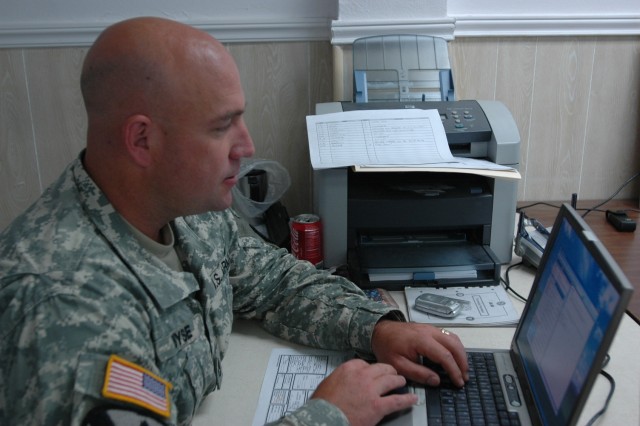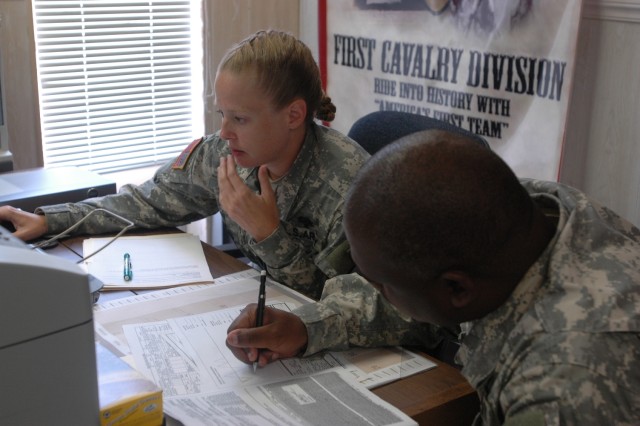FORT HOOD, Texas- "We try to give Soldiers what the civilian world can't," said Sgt. Daniel Brown, a retention noncommissioned officer for the 1st Squadron, 7th Cavalry Regiment, explaining his role of helping Soldiers when they are deciding whether or not to reenlist.A,A
Brown, a Chicago, Ill. native and retention noncommissioned officer for 1st Battalion, 7th Cavalry Regiment, and the other battalion retention NCOs from the 1st Brigade Combat Team, 1st Cavalry Division meet weekly with Laredo, Texas native Sgt. 1st Class Humberto Flores and his team of career counselors at the 1st Brigade headquarters to discuss ways of keeping Soldiers in boots.
"We offer (the Soldiers) job security and if they have families we show them what the Army can offer their families in terms of benefits," said Brown.
Flores, who is the brigade's senior career counselor, spends his time counseling Soldiers on the benefits of staying in the Army. He and his team meet 20 or more Soldiers a day to counsel them on what they can expect if they re-enlist.
"We let them decide how long they want to re-enlist for," said Flores. "We give them their options and then let them take the step to re-enlistment. Our job is making sure they have all the available information to make an informed choice."
In the current economic climate Soldiers are opting to re-enlist for job security and medical benefits. The cost of health insurance alone is enough to keep Soldiers coming back to a job that sends them on deployments every other year.
"Some Soldiers re-enlist because they like the action, said Flores. "You have other Soldiers who have families to support and the rising cost of living and health expenses plays into their decision to stay in the Army."
Staying in the Army during time of war is often a factor for the families of the Soldiers who are considering re-enlistment said Flores.
"A Soldier's family, who is supportive of him or her, can oftentimes be the deciding factor for the Soldier on his decision to stay in the Army. Families are the biggest benefit to the Soldier," Flores said. "By providing low cost health coverage and other benefits we gain more support from the families and in turn more support for the Army."
Soldiers have a window of time to re-enlist. The re-enlistment window opens approximately 24 months before their initial contract ends.
Flores says that it's important for Soldiers not to wait when thinking about re-enlisting. The two year window is just that, a window. Soldiers need to re-enlist at least six months before their initial contract ends.
"It's crucial that Soldiers get their re-enlistment choice made and the paperwork done so interruption of finance and benefits is not a problem," said Flores. "We want the re-enlistment to run as smoothly as possible."
Smooth is not always possible. For the same reason some Soldiers re-enlist, the same reasons are why some Soldier's don't re-enlist.
Deployment is often an issue for Soldiers.A,A Soldiers who have deployed in the past may be reluctant to re-enlist and deploy again. The reason is oftentimes family.A,A But this is not always the case, according to Flores.
"We have a lot of Soldiers who re-enlist simply because they wish to answer the call of duty. Soldiers and their families show their continuing support by re-enlisting," said Flores.
This call of duty is evident by the number of re-enlistments the brigade processes in a month. The monthly total averages about 40 to 50. Those are good numbers comparatively speaking when you look at the overall retention levels before the start of the Global War on Terrorism, said Flores.
Prior to the Operation Iraqi Freedom and Operation Enduring Freedom rates were about the same according to Flores and the records kept by the retention office.
"There hasn't been a drastic change in retention rates," said Flores. "We are meeting and exceeding goals for the Brigade. I don't know what the enlistment rates are for first timers coming into the Army but at our level there hasn't been a drastic change."
Flores said that he encourages Soldiers to go see their retention NCOs or the brigade career counselors if they have questions concerning their re-enlistment choices.
Staff Sgt. Rebecca Adams, a native of Fort Wayne, Ind. and career counselor at brigade headquarters said whatever the Soldier chooses they will help.
"We can help Soldiers create a short term or long term plan," said Adams. "Either in or out of the Army but we hope it's in the Army."




Social Sharing